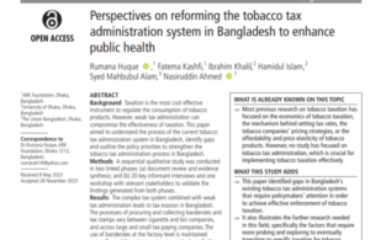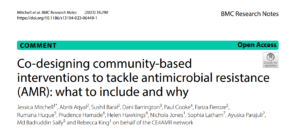To effectively manage non communicable diseases (NCDs), it is essential to collect and maintain comprehensive data from across the multitude of organisations providing health care services. In the urban context of Bangladesh, these include primary healthcare (PHC) facilities, urban dispensaries, NGO clinics and private providers. Comprehensive patient data can inform decision making, monitor health indicators, and allow follow up by health professionals, which is so important for providing quality NCD services and improving patient outcomes.
However, in urban Bangladesh, the lack of mechanism of shared record keeping across multiple providers, and the lack of follow up causes a lack of standardised care across urban health systems, hampering effective service delivery.
The Problem
The Bangladesh government has taken steps to address the rising NCDs, however a significant health system challenge is the lack of accessible individual patient data. Without this data, health professionals are unable to effectively track a patient’s history and provide tailored care. As part of the CHORUS Project 1 in Bangladesh, ARK Foundation examined current data management functions and tools within the health system.
The existing health information system was found to lack coordination in several aspects:
- The District Health Information Software – 2 (DHIS2), operated by the Ministry of Health and Family Welfare (MoHFW) primarily focuses on maternal and child health indicators. Of the NCD data it does include, it does not incorporate data from the urban PHC facilities (Government Outdoor Dispensaries or Urban Dispensaries (UDs) under the Ministry of Health and Family Welfare (MoHFW)); or the NGO clinics operating under the MoLGRD&C;
- The NCD-related data included in the DHIS2 has not been updated since 2018, and is outdated;
- Development partners and INGOs have separate dashboards, not integrated with DHIS2. causing fragmentation;
- Despite numerous organisations working to digitalise the health system in Bangladesh, the focus has been towards the rural health system, and there are gaps in the urban NCD data.
What We Did
The gaps identified within the urban PHC system during the CHORUS project has led to continuous engagements between the CHORUS team at ARK Foundation and the MoHFW, MoLGRD&C and development partners, in the forms of meetings and workshops.
Engagement with Ministry of Health and Family Welfare: We linked with NCDC to collaboratively consider ways to strengthen the Health Information System at urban primary healthcare centres. An MoU was signed between the NCDC and ARK Foundation, as the first step, which has strengthened partnership between the two organisations.
As NCD data from Government Outdoor Dispensaries are not integrated within the DHIS2 dashboard, the CHORUS team engaged with the Dhaka Civil Surgeon Office and the Upazilla Health Care, as well as the dispensaries, and together, we identified which dispensaries could integrate data into the DHIS2 dashboard.
Engagement with Ministry of Local Government and Rural Development: Working with the Health Department of Dhaka North City Corporation (DNCC), we assessed the NGO clinics which were operating under the Urban Primary Health care Service Delivery Project which could facilitate the strengthening of the Health Information System in relation to NCDs. The CHORUS team also worked with the health care staff of the selected NGO clinics to strengthen the reporting and recording of NCDs.
Engagement with Development Partners: A steering committee was formed with members of the NCDC, Dhaka Civil Surgeon Office, Upazilla Health Care and the DNCC, as well as development partners including UNICEF, WHO, BRAC, icddr,b and NHF. The steering committee led the co-creation of an intervention to focus on strengthening NCD HIS, by expanding the use of the ‘Simple App’ to the urban context. The Simple App is an existing health data software already operational in rural NCD corners and linked to the DHIS2 dashboard.
ARK Foundation was provided access to the Simple App to record and publish urban NCD data from 10 urban NCD centres. Medical Assistants from each centre were trained to collect comprehensive patient data, which includes 14 different variables related to NCDs. The enhanced Simple App now receives follow-up data on patients, including information about their medications, marking an important advance in NCD management.
Pathway to Impact
NCDC and the CHORUS team at ARK Foundation are collaborating to analyse this data and formulate policies aimed at addressing NCDs in urban areas of the country. As of March 31, 2024, 16 urban primary healthcare centres are using the Simple App, and had reported 398 cases of hypertension, 205 cases of diabetes mellitus, and 137 cases of both hypertension and diabetes. Building on the success so far, NCDC has pledged to establish additional NCD corners at Urban Dispensaries and NGO clinics in Dhaka, in collaboration with ARK Foundation. These NCD centres will be equipped with necessary amenities to support successful NCD service delivery. New Urban Dispensaries (UDs) and NGO clinics will be included in the list of those centres using the Simple App, and with ARK Foundation’s support, the use of Simple App will expand to UDs in one of Bangladesh’s secondary cities, Khulna.
For more information – read our blog on our ‘Simple’ solution to the urban health data dearth https://chorusurbanhealth.org/blog-arks-simple-solution-to-the-urban-data-dearth/
Originally published in: https://chorusurbanhealth.org/pathway-to-impact-improving-patient-ncd-data-in-urban-bangladesh/




